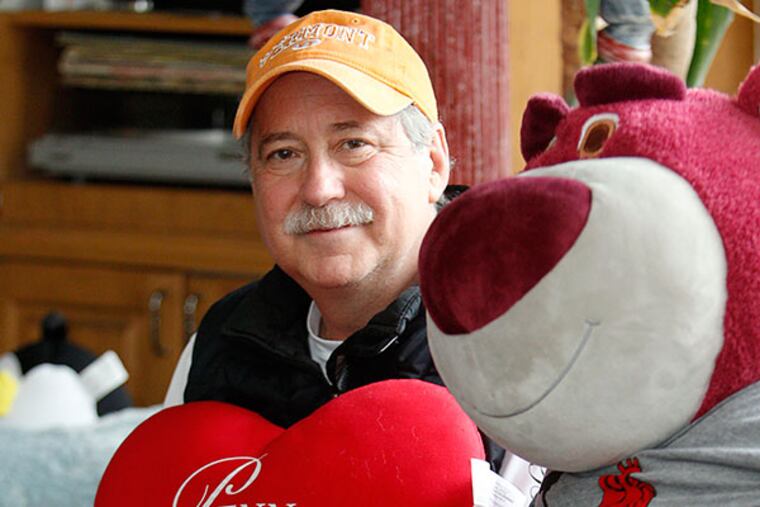Before and after transplant, intent on a normal life
Robert Goodman says a new heart hasn't made him a new man. Not yet, anyway. "I haven't quite gotten to the point of waking up every day and saying, 'I'm glad I'm alive,' although I do think about that," says the Westampton resident, 62.

Robert Goodman says a new heart hasn't made him a new man. Not yet, anyway.
"I haven't quite gotten to the point of waking up every day and saying, 'I'm glad I'm alive,' although I do think about that," says the Westampton resident, 62.
"I'm more amazed that I was almost dead, and nobody really knew it. Not even me."
Goodman, who's married and has a daughter in college, is a longtime runner and fitness buff. He wanted to avoid the fate of his dad, who died of a heart attack, at 50, "five months before my bar mitzvah."
And during his 40-year career in health-care finance and management, Goodman has specialized in turning around distressed medical practices and facilities.
So the quick-witted and (occasionally) salty-tongued fellow is familiar with long distances and new directions - knowledge that's been useful after the heart transplant he underwent at the Hospital of the University of Pennsylvania on Nov. 24.
Annually, about 2,300 Americans have such operations, according to the American Heart Association. Donors and recipients are matched anonymously.
"I came home on Dec. 9, weak as hell," Goodman recalls, sharing a table with me at Espressit Coffee in Westmont. "I weighed 124 pounds, and after the swelling went down, I weighed 119 pounds.
"Humor [is] part of my attitude toward this," he adds, between sips from a bottle of water. "It's not so much, 'I'm going to lick this thing.' It's, 'Let's get this fixed.' "
Goodman, who was born in Newark, became a transplant candidate after a pacemaker, a defibrillator, and a procedure called an ablation could not fix his ailing heart.
Turned out the organ was being destroyed by a relatively rare, poorly understood, and often undiagnosed condition called cardiac sarcoidosis.
"A typical sarcoidosis patient . . . is an African American female who has it in [her] lungs," Goodman recently told an audience during a service at Adath Emanu-El, the Mount Laurel synagogue where he is an active member.
"An Ordinary Guy Gets a Heart Transplant" was the title of his speech, a copy of which he shared with me.
"Bob is a mensch," Rabbi Benjamin David says. "He has experienced something so trying, emotionally and physically, and yet he remains optimistic, hopeful, and kind. There's a lesson there for all of us."
Goodman is thankful for the professional care he received and the support that bolstered him, particularly from his daughter, Stephanie, and Patti, his wife of 37 years.
The transplant "has intensified his inner being," says Patti, 58, a marketing consultant.
"He's always been tenacious, but this experience has exacerbated his tenacity," she says.
Her husband is determined to prevent the illness that has disrupted their lives from diminishing them. Or him. He also wants to educate others about heart health.
"He fought so hard to live as normal a life as he could before the transplant," Patti says. "Now he's focused on how he can get back to living a normal life."
Goodman says normal means no more of the coughing and severe shortness of breath caused by sarcoidosis. It means cardiac rehab and a regimen of antibiotics, antirejection medications, and other drugs.
But the protocols have not prevented him from enjoying his new freedom. And his relationship with Judaism has been energized, too.
"I don't know another word of Hebrew, but I've developed more of a kinship that's very much wrapped around [individual] people," Goodman says. He started driving again in January - and, by the way, looks terrific.
He told the Adath Emanu-el audience on March 14 that he has "a lot more to do with my life and am far from ready to give up on those things - whatever they are."
And he told me that he thinks about the donor, whose identity he does not know, often.
"There are no good words," Goodman says, "except, 'I'm grateful, thank you, and God bless you.' "